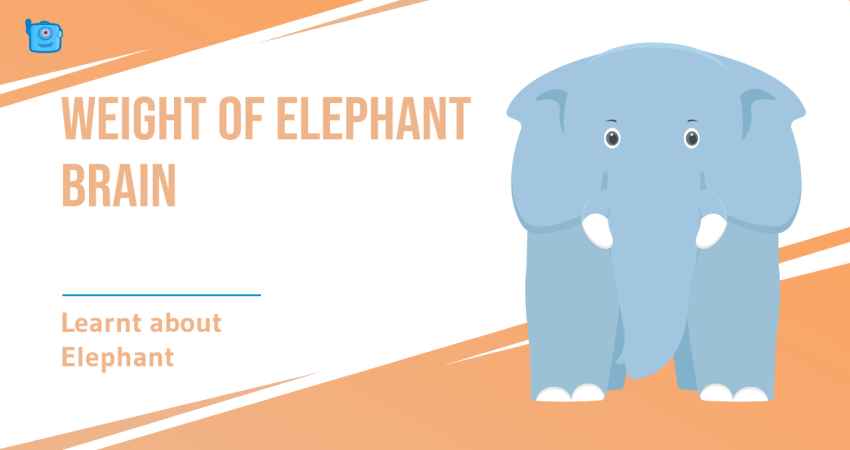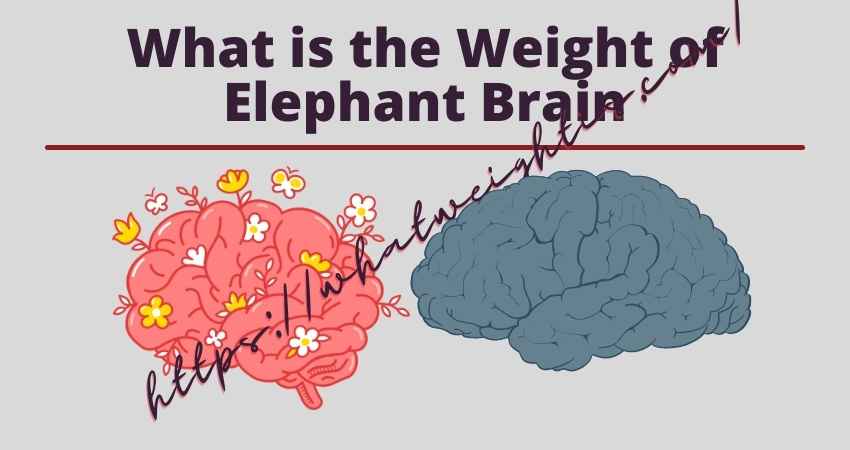The brain of an elephant is huge. It weighs between 7 and 10 kilograms. The brain of a human being only weighs about 1.4 kilograms. The Weight of the Elephant Brain can also be more than two-and-a-half times the size of a human’s brain. The elephant brains work by using a lot of energy. This is because the elephant brain has many cells and it needs to be very active all the time. The brain does not have sleep or rest periods as we do in our bodies. The elephant’s brain cannot stop working when it is sleeping, which is good for thinking.
How does the brain of an elephant work?
The elephant’s brain is also very good at controlling the body. It makes sure that everything is working properly. When an elephant walks, it keeps its head up so that it can see where it is going and how to get there safely. The reason why elephants have big brains is that they need to be able to think and do things at the same time.
There are many different parts of an elephant’s brain. The cerebrum is the largest part of the brain, which controls all other parts of the body. It also has a lot of nerve cells that help it control other parts of the body. The cerebrum also has two lobes, one on each side of the brain.

The elephant’s cerebrum is divided into four different areas: The forebrain, midbrain, hindbrain, and pons. These areas work together to control all other parts of the body. The elephant’s cerebrum is bigger than that of a human being because it has more nerve cells in it. This means that the elephant can think and do things at the same time, which is good for running away from lions!
The elephant’s brain also helps to control the body’s other organs. The cerebrum controls the heart, lungs, and digestive system. It also helps to control the elephant’s breathing by controlling its diaphragm muscle. This means that when an elephant breathes in, it pushes down on the diaphragm which makes all of the other muscles work.
The elephant’s cerebrum also controls the rest of its body by controlling the smooth muscle in the blood vessels and the stomach. The brain sends messages to these parts of the body, telling them what to do and when to do it. https://youtu.be/2gDISkUa1OM
What does an elephant’s brain look like?
An elephant’s brain is very big and looks quite different from a human being’s. It has many folds in it, which are called gyri. These folds help to make the brain more compact so that it can fit into the space available inside an elephant’s skull.
How much does the Weight of an Elephant Brain?
An elephant’s brain weighs around 12 kilograms (26 pounds). This is about the same as a human being, but it would take an enormous gorilla to lift this much weight!
You can check out Weight of an Elephant Seal
Why does an elephant have such a big brain?
A very important function of the cerebrum is controlling the heart and the blood vessels. This means that an elephant’s brain has to be big enough to control its heart rate, blood pressure, and breathing as well as be able to send messages from one part of the body to another.
These fibers connect the cerebrum with the thalamus, which is in the middle of the brain and contains many nerve cells.
The nerves from these cells link up with groups of motor neurons, which send messages to the nerves that control the muscles of the body. The motor neurons also send messages to a special group of nerve cells in each muscle called neuromuscular junctions. These cells help to make sure that all the muscles contract at exactly the same time so that an elephant can move as one unit.
A second important function of the cerebrum is to control thinking and memory. This means that it must be large enough to hold all the information needed for learning, making decisions, and storing memories.
How big is an elephant’s brain compared to a human’s brain?
A human brain weighs about 1.4 kilograms (3 pounds) and an elephant’s brain is about three times bigger than this! The cerebrum of a human being has about the same weight as the cerebrum of an elephant, but it would take two elephants to lift it. A human being’s cerebrum is about the size of a large orange.
The cerebrum of an elephant weighs three times as much as that of a human being, but it would take two elephants to lift it! The cerebrum of a human being is about the size of an orange.
Why does it take so much energy to keep an elephant alive?
A big brain takes a lot of energy to run, because there are lots of nerve cells in it and they have to work hard all the time. In a normal elephant, about 2% of the body’s energy is used to keep the brain alive. In a human being, this figure is only 0.5%. This means that an elephant has to eat nearly six times as much food each day just to supply its cerebrum with energy.
How much food does an elephant eat each day?
An adult male elephant eats about 9 kilograms (20 pounds) of food every day. An adult female elephant eats about 7 kilograms (15 pounds) of food every day. These figures include a large amount of water needed to keep the elephant’s body functioning properly.
Why elephant is important in our world?
Elephants are an important part of the world’s ecosystem. They keep the forests and grasslands healthy by eating lots of different kinds of plants and trees, and they help to spread seeds around for other animals to eat.
The elephant is a very useful animal because it can carry heavy loads of wood and food back to its home range. Elephants are very important for humans too because they help us to look after the forests in which we live.
Where do elephants live?
Elephants live in most of Africa, parts of India and Southeast Asia, southern China, and some parts of Europe.
How do elephants live?
An elephant lives in a family group, which is made up of the mother and her babies (the “daughters”), their mothers, and other female relatives. Each family group has its own territory that it defends against other groups. A family group usually consists of about 10 to 20 members.
The family groups stay together all the time, even when they are sleeping or eating. They move around a lot as well, and they go on long foraging trips at night.
What do elephants eat?
Elephants eat lots of different kinds of plants and trees. They also eat lots of grasses, bushes, roots, bark, fruit, and nuts. The young elephants (the “daughters”) take care of the babies when their mothers are away foraging in the forest. The young daughters stay with their families all the time, and they help their mothers look after the babies.
How do elephants communicate?
Elephants use many different kinds of sounds to talk with each other. They have different calls for different situations: from a call that means “I’m coming!” to a gentle sound that means ” It’s all right, you can come out now.” Elephants have a very strong sense of smell. They can smell plants and trees from far away, and they use this to find food in the forest. Elephants also have a good sense of hearing, so they can hear sounds from far away.
Mr. Jahangir Alam is an Electrical & Electronics Engineer with a wide range of experience in several fields of Engineering. He finds engineering articles to be very interesting, and that is why he likes to write them. To know more about him, please click here.

